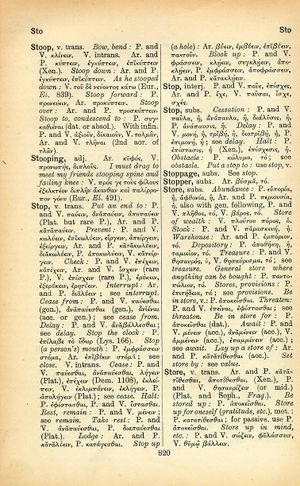stop: Difference between revisions
ἀγαπήσεις τὸν πλησίον σου ὡς σεαυτόν → love your neighbor as yourself, thou shalt love thy neighbour as thyself, love thy neighbour as thyself
(nlel) |
(CSV import) |
||
| Line 1: | Line 1: | ||
{{Woodhouse1 | {{Woodhouse1|Text=[[File:woodhouse_820.jpg|thumb|link={{filepath:woodhouse_820.jpg}}]] | ||
|Text=[[File:woodhouse_820.jpg|thumb|link={{filepath:woodhouse_820.jpg}}]] | ===verb transitive=== | ||
[[put an end to]]: [[prose|διαλύειν]]; <b class="b2">interrupt.</b> | |||
<b class="b2">Cease from</b>: P. and V. παύεσθαι (gen.), ἀναπαύεσθαι (gen.), ἀνιέναι (acc. or gen.); see [[cease from]]. | <b class="b2">Cease from</b>: P. and V. παύεσθαι (gen.), ἀναπαύεσθαι (gen.), ἀνιέναι (acc. or gen.); see [[cease from]]. | ||
| Line 46: | Line 40: | ||
<b class="b2">Obstacle</b>: P. [[κώλυμα]], τό; see [[obstacle]]. | <b class="b2">Obstacle</b>: P. [[κώλυμα]], τό; see [[obstacle]]. | ||
<b class="b2">Put a stop to</b>: use <b class="b2">stop</b>, v. | <b class="b2">Put a stop to</b>: use <b class="b2">stop</b>, v.|P.]] and [[verse|V.]] [[παύειν]], [[ἀναπαύειν]], [[ἀποπαύειν]] ([[Plato]] but rare [[prose|P.]]), [[Aristophanes|Ar.]] and [[prose|P.]] [[καταπαύειν]]. | ||
[[prevent]]: [[prose|P.]] and [[verse|V.]] [[κωλύειν]], [[ἐπικωλύειν]], [[εἴργειν]], [[ἀπείργειν]], [[ἐξείργειν]], [[Aristophanes|Ar.]] and [[prose|P.]] [[κατακωλύειν]], [[διακωλύειν]], [[prose|P.]] [[ἀποκωλύειν]], [[verse|V.]] [[κατείργειν]]. | |||
[[check]]: [[prose|P.]] and [[verse|V.]] [[ἐπέχειν]], [[κατέχειν]], [[Aristophanes|Ar.]] and [[verse|V.]] [[ἴσχειν]] (rare [[prose|P.]]), [[verse|V.]] [[ἐπίσχειν]] (rare [[prose|P.]]), [[ἐρύκειν]], [[ἐξερύκειν]], [[ἐρητύειν]]. | |||
[[interrupt]]: [[Aristophanes|Ar.]] and [[prose|P.]] [[διαλύω]], [[διαλύειν]]; [[interrupt]]. | |||
[[cease from]]: [[prose|P.]] and [[verse|V.]] [[παύεσθαι]] (gen.), [[ἀναπαύεσθαι]] (gen.), [[ἀνιέναι]] (acc. or gen.); see [[cease from]]. | |||
[[delay]]: [[prose|P.]] and [[verse|V.]] [[ἀναβάλλεσθαι]]; see [[delay]]. | |||
[[stop the clock]]: [[prose|P.]] [[ἐπίλαβε τὸ ὕδωρ]] (Lys. 166). | |||
[[stop]] (a [[person's]]) [[mouth]]: [[prose|P.]] [[ἐμφράσσειν στόμα]], [[Aristophanes|Ar.]] [[ἐπιβύειν στόμα]]; see [[close]].===verb intransitive=== | |||
[[cease]]: [[prose|P.]] and [[verse|V.]] [[παύεσθαι]], [[ἀναπαύεσθαι]], [[λήγειν]] ([[Plato]]), [[ἐπέχειν]] ([[Demosthenes|Dem.]] 1108), [[ἐκλείπω]], [[ἐκλείπειν]], [[verse|V.]] [[ἐκλιμπάνειν]], [[ἐκλήγειν]], [[prose|P.]] [[ἀπολήγειν]] ([[Plato]]); see [[cease]]. | |||
[[halt]]: [[prose|P.]] [[ἐφίστασθαι]], [[prose|P.]] and [[verse|V.]] [[ἵστασθαι]]. | |||
[[rest]], [[remain]]: [[prose|P.]] and [[verse|V.]] [[μένειν]]; see [[remain]]. | |||
[[take rest]]: [[prose|P.]] and [[verse|V.]] [[ἀναπαύεσθαι]], [[prose|P.]] [[διαπαύεσθαι]] ([[Plato]]). | |||
[[lodge]]: [[Aristophanes|Ar.]] and [[prose|P.]] [[καταλύω]], [[καταλύειν]], [[prose|P.]] [[κατάγεσθαι]]. | |||
[[stop up]] (a [[hole]]): [[Aristophanes|Ar.]] [[βύειν]], [[ἐμβύειν]], [[ἐπιβύειν]], [[πακτοῦν]]. | |||
[[block up]]: [[prose|P.]] and [[verse|V.]] [[φράσσειν]], [[κλῄειν]], [[συγκλῄειν]], [[ἀποκλῄειν]], [[prose|P.]] [[ἐμφράσσειν]], [[ἀποφράσσειν]], [[Aristophanes|Ar.]] and [[prose|P.]] [[κατακλῄειν]].===interjection=== | |||
[[prose|P.]] and [[verse|V.]] [[παῦε]], [[ἐπίσχες]], [[Aristophanes|Ar.]] and [[prose|P.]] [[ἔχε]], [[verse|V.]] [[παῦσαι]], [[ἴσχε]], [[σχές]].===substantive=== | |||
[[cessation]]: [[prose|P.]] and [[verse|V.]] [[παῦλα]], ἡ, [[ἀνάπαυλα]], ἡ, [[διάλυσις]], ἡ, [[prose|P.]] [[ἀνάπαυσις]], ἡ. | |||
[[delay]]: [[prose|P.]] and [[verse|V.]] [[μονή]], ἡ, [[τριβή]], ἡ, [[διατριβή]], ἡ, [[prose|P.]] [[ἐπιμονή]], ἡ; see [[delay]]. | |||
[[halt]]: [[prose|P.]] [[ἐπίστασις]], ἡ ([[Xenophon|Xen.]]), [[ἐπίσχεσις]], ἡ. | |||
[[obstacle]]: [[prose|P.]] [[κώλυμα]], τό; see [[obstacle]]. | |||
[[put a stop to]]: use [[stop]], v. | |||
}} | }} | ||
{{nlel | {{nlel|nleltext=[[κρήδεμνον]], [[παύω]] | ||
|nleltext=[[κρήδεμνον]], [[παύω]] | |||
}} | }} | ||
Revision as of 15:40, 27 April 2020
English > Greek (Woodhouse)
verb transitive
put an end to: διαλύειν; interrupt.
Cease from: P. and V. παύεσθαι (gen.), ἀναπαύεσθαι (gen.), ἀνιέναι (acc. or gen.); see cease from.
Delay: P. and V. ἀναβάλλεσθαι; see delay.
Stop the clock: P. ἐπίλαβε τὸ ὕδωρ (Lys. 166).
Stop (a person's) mouth: P. ἐμφράσσειν στόμα, Ar. ἐπιβύειν στόμα; see close.
V. intrans. cease: P. and V. παύεσθαι, ἀναπαύεσθαι, λήγειν (Plat.), ἐπέχειν (Dem. 1108), ἐκλείπειν, V. ἐκλιμπάνειν, ἐκλήγειν, P. ἀπολήγειν (Plat.); see cease.
Halt: P. ἐφίστασθαι, P. and V. ἵστασθαι.
Rest, remain: P. and V. μένειν; see remain.
Take rest: P. and V. ἀναπαύεσθαι, P. διαπαύεσθαι (Plat.).
Lodge: Ar. and P. καταλύειν, P. κατάγεσθαι.
Stop up (a hole): Ar. βύειν, ἐμβύειν, ἐπιβύειν, πακτοῦν.
Block up: P. and V. φράσσειν, κλῄειν, συγκλῄειν, ἀποκλῄειν, P. ἐμφράσσειν, ἀποφράσσειν, Ar. and P. κατακλῄειν.
interj.
P. and V. παῦε, ἐπίσχες, Ar. and P. ἔχε, V. παῦσαι, ἴσχε, σχές.
subs.
Cessation: P. and V. παῦλα, ἡ, ἀνάπαυλα, ἡ, διάλυσις, ἡ, P. ἀνάπαυσις, ἡ.
Delay: P. and V. μονή, ἡ, τριβή, ἡ, διατριβή, ἡ, P. ἐπιμονή, ἡ; see delay.
Halt: P. ἐπίστασις, ἡ (Xen.), ἐπίσχεσις, ἡ.
Obstacle: P. κώλυμα, τό; see obstacle.
Put a stop to: use stop, v.

